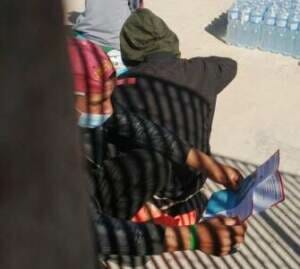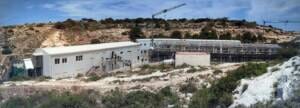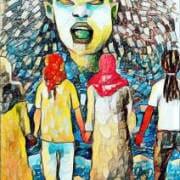Lampedusa and the never-ending emergency
Article first published on May 25, 2021
A few days after the arrival of more than 2,000 people on Lampedusa, I went to the island to monitor the situation. What emerged during the days I spent there is a very different reality from the one portrayed by our newspapers.
What is behind the landings emergency in Lampedusa
Over the four days I spent on Lampedusa, talking to different people and organisations – in particular Mediterranean Hope, the Lampedusa Solidarity Forum, doctors and nurses from the health center, but also local fishermen and traders – I discovered an island that was different from what I expected, from what I had always seen, told and narrated.
There are three levels on which the narrative of the so-called ‘Lampedusa landings emergency’ operates in the collective imagination and impacts on the lives of people, foreigners and locals. The emergency diverts attention, prepares announcements, justifies actions.
Perhaps this is why – while acknowledging that there have been days when the situation was out of control, with people sleeping on the Molo Favaloro – the people in solidarity on Lampedusa keep repeating: ‘There is no immigration emergency here’. And that the problems are much bigger and more structural.
The emergency distracts attention from the politics of death
First of all, the emergency draws attention away from the deaths in the Mediterranean. Again, on 13 May, 17 people from Libya drowned off the Tunisian coast, and in recent days Alarm Phone has reported several situations of boats adrift, with their engines broken down, with people’s lives in danger. It is clear that the lives of these people are not worth the same as others, and that the aim is to erase their personal histories and experiences, and this is all the more true in the face of what is emerging as the new strategy of the Italian government and the European Union to protect the borders and outsource border control.
In recent weeks, with humanitarian ships far from the Channel of Sicily – only a few days ago the Sea-Eye 4 was at sea and has already boarded more than three hundred people and is docked in Pozzallo – Libyan patrol boats, with the support of patrol flights operated by Frontex, have intercepted boats with hundreds of people on board and brought them back to Libya. In the night of 16-17 May alone, 683 people were intercepted by the so-called Libyan Coast Guard.
If the situation continues as it has in the past two weeks – in which 2,000 people have arrived in Italy, but just as many have been detained – the scenario built politically in recent years will be determined, which can be defined as “early rejection” or, more commonly, the outsourcing of border control, with the Channel of Sicily in which geopolitical interests are mixed with military strategies.
In short, when Giorgia Meloni, as well as right-wing politicians from Lampedusa, shout about the landings emergency and the need for a naval blockade, perhaps they do not realise that this, in fact, is already being implemented by the authoritarian border management put in place by the current government.
Another element concerns the process of militarisation, which does not only affect what happens at sea. Whoever, as in my case, takes a plane from Sicily for the first time and sees a dozen policemen on board, will think that they are reinforcements to manage the emergency situation reported by the press.
However, as people from Lampedusa have told me, and as I was able to observe while I was there, the militarisation of the island is now a structural fact, and it has become commonplace to travel and live with armed people, to meet them in the streets, to see trucks, to look at the horizon and always come across a gun.
This is not a very reassuring prospect, but no one talks about it, not least because the presence of the military guarantees an economic return for the island’s hoteliers and restaurateurs, who do not contest this asphyxiating presence.
Scoop journalism and the preparation of announcements
The island was full of journalists, rushing to film and report on the landings and, in fact, generating, and certainly fuelling, the narrative emphasising the landings emergency on Lampedusa – with a few exceptions.
I was very impressed by the interaction between traders, fishermen and journalists. During the four days on Lampedusa, I saw dozens of fishermen repainting the boat decks, dozens of shopkeepers painting facades, preparing flowerpots and cleaning shop windows in anticipation of the start of the summer season. Against this backdrop of a slow resumption of tourist activity, an ambiguous relationship of incomprehension, irony and protest has developed with journalists, the only real ‘foreigners’ on this island in the heart of the Mediterranean.
As when a Mediaset journalist, looking for a scoop, asked a fisherman “Do they arrive every day?”, without specifying the subject; and the fisherman, who deals with fish and not people, replied “Yes, fish arrive every day”, leaving the journalist empty-handed. Irony, like the way all the motorists laughed at the journalists huddled in front of the Favaloro pier, waiting for the longed-for landing. Finally, a hotelier was angry at the journalists who were reporting on the migrants’ boats in the background: “With all the boats there are, you have to film the Tunisian ones. Thanks from all the hoteliers”.
And the scoop journalism that aims the cameras only on the passing phenomenon is useful to prepare announcements by the government, which a series of clues clearly show. Minister Lamorgese rode the landings emergency by saying that 70,000 people are expected this summer, while in the weeks just before she had flown to Tunisia to talk about the renewal of the agreement with the government on the rejection of Tunisians.
Draghi, who also went to Libya recently to “rebuild the friendship between the two countries”, had gone to Tunisia shortly before.
In fact, new agreements will soon be announced with both countries to continue the process of externalising Europe’s southern border. Relations between Italy and Libya, in particular, are much closer and more dynamic than people would have us believe. The arrival of 2,000 people in one day was not just a consequence of the calm sea, but of power dynamics between the rulers of the two states.
Emergency justifies a certain technique of migration policy
Even after arriving in Italy, people remain ‘trapped’ in the Mediterranean. In April, in a series of anti-racist demonstrations organised all over Italy, people started to talk about the “digestive system”, in relation to the government of migration in Italy: from the sea to the hotspot, to the quarantine ship, up to (often) the detention and repatriation center, a real chain in which political experiments and deprivation of rights meet on the bodies of migrants, trapped. And, in the Lampedusa spectacle, emergency is used as a technique for governing migrant people. The reception system, always in emergency, justifies everything, often going beyond the law and imposing itself as a given reality. In this context, people’s faces and stories disappear.
Thus, little is known about those who have arrived in recent weeks: 2,000 people, including 600 unaccompanied foreign minors. They come mainly from the Ivory Coast, Eritrea, Somalia and Tunisia, and in much smaller numbers from Algeria and Morocco; there is also a Palestinian boy. There are also many Bengali people, especially minors, who a few months ago took the Mediterranean route as an alternative to the Balkan route where there was violence and death this winter. There are women and children, many with traumatic histories.
After disembarking, they were transferred to the hotspot, where stay times are very short for most people. Most were transferred to the quarantine ships Snav Adriatico and Allegra, which are now in Porto Empedocle. The minors were transferred to Sicily on two regular ferries. I witnessed the second transfer early on Saturday morning. One hundred and twenty minors waited seated on the commercial dock to be put on the ship, after being transported to the port in small vans, without much attention to the sanitary procedures that should justify the current level of segregation of people arriving in Italy.

Photo by Emilio Caja
At the port, two Save the Children workers were handing out small guides explaining that they would all be transported to Puglia and giving quick guidelines on the rights of these young people. But, for the second group, not enough time was given to explain to everyone, they had to embark, and quickly, so many found themselves with the guide in their hands without knowing what it was for.
With the help of the quarantine ships, the center was almost completely emptied in a few days. When I arrived, only women and children remained. Meanwhile, on Friday, with three new autonomous landings – one from Tunisia and two from Libya – another 150 people arrived on Lampedusa. Quarantine ships are therefore proving to be a fundamental tool in the management of migrants, creating floating hotspots, and it is therefore not surprising that the government has just opened a tender for four more ships.
Despite Frontex’s strategic presence at the landings, no suspected smugglers were identified, but four Tunisian men were reported for illegal re-entry into the territory. From the interviews with the staff of the health center, it does not appear that anyone has been taken to the polyclinic, while the doctor of the hotspot’s managing body, Nova Facility, is in charge of psychological vulnerabilities and minor physical traumas.
This brings us to a crucial point: the center where Nova Facility, Police, Frontex, UNHCR, Save the Children intermittently operate, and many law enforcement officers. Work on expanding the center is still in progress and is expected to bring the facility up to 700 places from the current 240. For almost a year now, the center has been manned by a dozen soldiers who patrol the area beyond the fences, but who still cannot prevent people from leaving. The ‘hole’, in fact, opens and closes according to a very simple equation: the longer a person is kept inside the hotspot, the more likely it is that at some point he or she will climb over the fences and go into the village to enjoy a few hours of freedom from the oppressive life of the center.

The hotspot in Contrada Imbriacola, Lampedusa – Photo by Emilio Caja
In the coming months we will have to see if the “widespread” hotspot approach between centers on the islands – we must also start talking about Pantelleria – and quarantine ships will withstand the pressure of the flows that economic crises and the (re)explosion of conflicts in the Middle East, as well as in Chad and Eritrea, can generate. Otherwise, we will see scenes of overcrowded centers and docks again, while we will continue to know nothing about those who spend weeks in the middle of the sea on quarantine ships.
Memory and mobilisation
On Lampedusa, however, there is not only this military and repressive plot. There are also people who are engaged in collective and political projects that can offer a different perspective.
The first is a work of living memory, to restore dignity, through tombstones and graves in the Lampedusa cemetery, to the nameless who died in the Mediterranean, or for those who do have a name, like Yusuf, who died at sea in November 2020. Following Yusuf’s death, the Lampedusa Solidale Forum set up the project “Yusuf’s blanket”, which brings together pieces of memory that are becoming the common heritage of those who do not want to surrender to this given reality.
Building a living memory, as Silvia Di Meo has written, is not an easy task, it means coming to terms with death, disappearance, absence, and also with our privilege of being Europeans, of being at the center of a world in which we direct development and control life, in which it seems impossible to stop, in which we must build only on life and we do not know – as this pandemic is illustrating – what it means to stop in the face of death. And so, living memory is essential to unite the two shores of the Mediterranean and fight against the authoritarian, racist and classist way in which borders are managed.
To do this, in Lampedusa, they are also beginning to think of a series of common words on which to build future mobilisations. The anti-racist movements of Black Lives Matter have indicated a path which is that of defunding the police (disinvesting resources from the police force).
As in a parallelism, and in front of the obvious policy of death of the European borders, we should, they say in Lampedusa, start talking about defunding the border, although it is clear that we start from a condition of disadvantage related to the large investments in security and defence of borders made by all European countries in this period.
Emilio Caja
Borderline Sicilia
Translation by Sandra Krause


